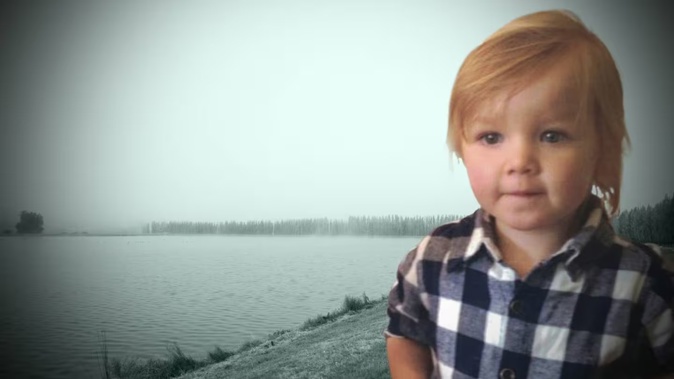
A senior detective who handled the immediate investigation into the death of a Gore toddler says hindsight and subsequent allegations have altered how he would have conducted some of his work.
On January 29, 2019, Lachie Jones was found dead late in the evening, face up in a council oxidation pond 1.2km from his home in Gore, Southland.
Initial police investigations concluded the boy drowned.
A 15-day coronial inquest into the death is in its second week. Lachlan’s mother Michelle Officer, brothers Cameron and Johnathan Scott, and other friends and neighbours have given evidence throughout the previous week.
Under questioning from Simon Mount KC, counsel assisting the Coroner Alexander Ho, Invercargill Police Detective Sergeant David Kennelly said he would have handled events differently given hindsight and subsequent allegations.

Detective Sergeant David Kennelly in the witness stand during the Lachie Jones inquest. Photo / Pool/Southland Times/Stuff
Kennelly was called to the scene as a member of the search and rescue squad, but after learning Lachie was dead on the way he attended as the senior Criminal Investigation Branch officer.
Lachie was found face up on the edge of the pond, with his knees bent and breaking the surface of the water - his back was submerged.
Kennelly recalled the night to be mild and still, with no breeze affecting water movement.
He said the scene had been marked, but a scene guard was not put in place.
- What happened to Gore toddler Lachlan Jones?
- Half-brother of Gore toddler Lachlan Jones denies involvement in his death
“I think in hindsight, for myself, knowing that later there was allegations made, I think we should have locked the scene down.”
Mount asked Kennelly why the temperature of the water and photographs were not taken - Kennelly said he had no reason for this.
Asked about the wooden fence to the oxidation pond, Kennelly said he thought it would have been very easy for a 3-year-old child to climb over it.
He told the inquest he did think about gathering forensic evidence from the gate, including swabbing, but opted against it as there had been a large number of people potentially contributing to scene contamination.
Given hindsight, he agreed with Mount that it would have been prudent to put a scene guard in place and do reconnaissance in the daylight hours.
Kennelly told the inquest he looked for injury on the body, he noted no blemishes aside from an incision on one side of his neck that he surmised was part of the resuscitation process, but he noticed no other marks.
He told the inquest he was satisfied he did everything he could do to establish the time of death.
Mount asked if he was comfortable that body temperature, water temperature, and ambient temperature were sufficiently established.
“No. In that regard, this was a reconnaissance and the time of death, body temperature, and the like would be something for an expert,” said Kennelly.

Lawyer Simon Mount KC at the Invercargill courthouse on Thursday during the coronial inquest into Lachie Jones' death. Photo / Southland Times/Stuff
Mount noted a report from an experienced pathologist that the sudden death of young children very often fits into a zone of uncertainty, asking Kennelly if he agreed this case should have been flagged as falling into that zone.
“In terms of the allegations that were later made, possibly yes,” said Kennelly.
Under questioning from Police counsel Robin Bates, Kennelly recalled a similar incident shortly after Lachie’s death he attended where a 6-year-old child drowned on a farm.
In that incident, the child was also barefoot and had travelled down a gravel path he estimated to be 800 to 900m.
In that incident, the child had no injuries on his feet, aside from a scratch on his toe, he told the inquest.
Paradise ducks moulting on oxidation pond evening of Lachie’s death, farmer says
A farmer who owns the land where the oxidation ponds are located says there were hundreds of paradise ducks moulting on the pond at the time of Lachie’s death.
Ross Grant told the inquest that his family has been farming in the area for around 120 years and owned the land around the oxidation ponds for more than 15 years.
He said his livestock had been removed from the land around the ponds around two weeks prior to Lachie’s death, but there were 500-1000 moulting and flightless paradise ducks living on the pond.
The inquest has previously been told by family and friends of Lachie that he allegedly loved to chase ducks around bodies of water.
Under questioning from Bates, Grant told the inquest the ducks would usually go to the banks of the ponds to graze at dusk.
He told the inquest that on occasion, sheep had fallen into the pond which he would then retrieve by waiting for the animal to drift to the edges and removing them with a tractor.
“Nothing ever stayed in one place, unless it was absolutely calm. And there was a bit of a current in there too I think.”
He told the inquest that on the evening of Lachie’s death, there was a northerly wind.
Mount noted weather reports from that evening, taken from a station around 4km away, that recorded a wind of 3.7km at 8 pm that rose to 13km at 9pm.
The inquest is ongoing.
Ben Tomsett is a Multimedia Journalist for the New Zealand Herald, based in Dunedin.
This article was originally published on the NZ Herald here.
Take your Radio, Podcasts and Music with you









